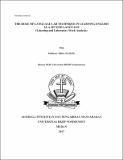THE ROLE OF LANGUAGE LAB TECHNIQUE IN LEARNING ENGLISH AS A SECOND LANGUAGE
Abstract
The Role of Language Lab Technique in Learning English as a Second Language (Listening and Laboratory Work Analysis) is explained. The study is aimed to find out the phenomenon and to proof the effectiness of a process of learning by applying language lab technique in listening subject of English as a second language. The research was carried out by teaching grade III students of English majority of HKBP Nommensen University of Medan. The sample is selected by using purposive sampling to choose two classes in the faculty, thy are grup A and B. The data were collected by using a set of listening test that covering all subjects beeing taught. The effectiveness of the teaching method into the students’ achievement in teaching is obtained from their ability to answer the question before teaching (pre-test and after learning process have been conducted (post-test). The result of research showed that the data are normally distributed. There is effectiveness or influence of laboratory work method to increase students’ achievement in teaching English esspecially in listening and laboratory work. One of the most interesting aspects of the lessons was the way in which the teacher integrated the various technologies and harnessed their potential for language learning. Also, the teacher used the lab space very effectively as a classroom environment, with a variety of pace and interaction patterns. The original language labs are now very outdated. They allowed a lecturer to listen to and manage student audio via a hard-wired analogue tape deck based systems with ‘sound booths’ in fixed locations. The language laboratory is a very helpful tool for practicing and assessing one’s speech in any language. It provides a facility which allows the student to listen to model pronunciation, repeat and record the same, listen to their performance and compare with the model, and do self-assessment. Language laboratory gives every learner of any language freedom to learn at their own pace, it is flexible and does not necessarily require a lecturer all the time. At the same time, it is possible for lecturers to provide assistance individually and collectively. This study also shows that in order to become fully effective users of multimedia language labs, language lecturers need to be both technically and pedagogically proficient.
Collections
- LP - Report Research [230]

